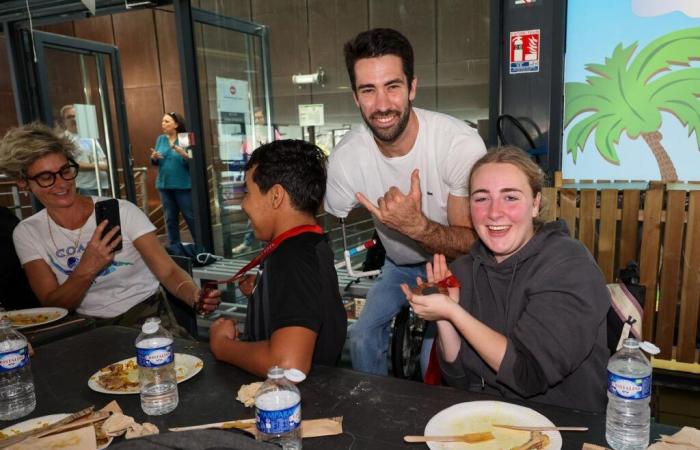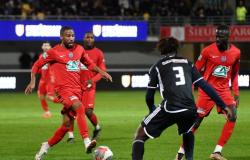
Véronique Petitcolas is a former burn victim. She is also hard of hearing. This resident of Saint-Médard-en-Jalles is one of 22 people with disabilities who joined Guyenne HandiNages in September, 13 of whom are under 18 years old. The popularity, positive state of mind and results of Laurent Chardard, double bronze medalist at the Paris 2024 Paralympic Games, had a lot to do with it. His club, the only one in Gironde specializing in disabled swimming, now has 78 members, an increase of 28%. “This is our absolute record since 2010, the year the French Disabled Sports Federation began to establish statistics,” notes its president, Stéphanie Smadja. We went down to 38 during the 2020-2021 season, that of Covid. »
Véronique Petitcolas is 61 years old. She was very sporty before the fire in 1991 in her Strasbourg apartment, “a flashover, as the firefighters say”. In a flash, “the flame licks your body”. While saving her two sons from the fire, she suffered 80% third-degree burns. “I have had 14 transplants. The water was restorative. In spa treatment, I received filiform jets. Today, the after-effects are practically invisible. It’s incredible. But it’s not just the skin. The lumbar and cervical vertebrae were affected. »
“I rediscover the pleasure of swimming”
Most new registrants do not know how to swim when they take the Guyenne HandiNages tests, necessary to form groups. She, on the contrary, had left to make a career. At 14, Véronique Petitcolas broke Lorraine’s 100-meter breaststroke record in her age category. Then she branched off into football, playing left-back at Commercy, in the Meuse. With a regional selection sponsored by Michel Platini, the native of the country, she played against PSG in the Coupe de France.
A former educator for young autistic people, currently undergoing professional retraining at the Tour de Gassies to become an administrative secretary, she bought a television especially for the Olympic and Paralympic Games. She had been without it for fifteen years. “It’s magnificent what they showed us, Léon Marchand, Laurent Chardard and Émeline Pierre. There was a crazy atmosphere. » The enthusiasm they exude made him want to take the plunge again, to the point of considering competing again, as a senior.
For hearing impairment, it is category S15. “I am rediscovering the pleasure and sensations of swimming. Some swimmers, who are in wheelchairs, arrive half an hour before me at the pool. Getting into a swimsuit, then getting dressed afterwards, is a double effort. I have nothing nearby. »
“He has a rage for life which is quite incredible. He is an extraordinary personality”
According to Stéphanie Smadja, the hardest part is precisely that. “Taking off a wet swimsuit when you have a disability is an ordeal. There is also the image that your body reflects to you, which you will display in a public place. The problem of the gaze of the other is complex. » In this, Laurent Chardard’s attitude conveys a mental strength which can help to cross this threshold. Victim in 2016 of a shark attack while surfing in Reunion, his native island, the Pessacais man had his right arm and right leg amputated. “On the edge of the pool, he removes his prostheses as if nothing had happened,” says Stéphanie Smadja. For him, it’s so natural. He has a rage for life that is quite incredible. He is an extraordinary personality. »
“Everyone can swim”
Former coach of the Pôle France Relève at Creps de Bordeaux, Aurélie Tassel is responsible for coaching at Guyenne HandiNages. “Instilling confidence in the beneficiary is the first thing we must do,” explains this specialist. He has the same representations as an able-bodied person, namely that one can drown easily, be swallowed up. We start by talking about Archimedes’ thrust, which means that any body immersed in a liquid is attracted from the bottom to the top. »
For serious pathologies, trainers go into the water with the person they are caring for. The key is to have enough slots in the swimming pools, which is the case in Bordeaux, thanks to the attention that the town hall’s sports department has always shown, according to Stéphanie Smadja. “You can’t have six, eight or ten people swimming in the same line,” she notes. You have as many disabilities as there are people who have a disability. The teaching is completely individualized. Everyone can swim, or enjoy aquatic well-being, regardless of their disability. The main obstacle to practice is yourself or those around you. »





